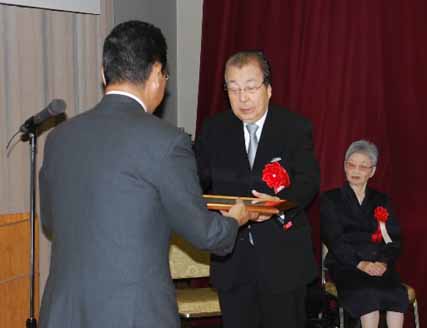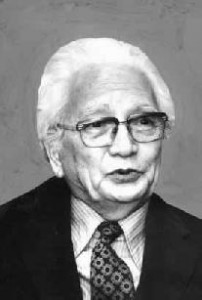Akihiro Takahashi receives Kiyoshi Tanimoto Peace Award
Nov. 22, 2008
by Yuji Yamamoto, Staff Writer
The 20th Kiyoshi Tanimoto Peace Award Ceremony was held at the Hiroshima Institute of Technology in downtown Hiroshima on November 9, honoring Akihiro Takahashi, 77, former director of Hiroshima Peace Memorial Museum, with its award.
Mamoru Tsuru, chairman of the Hiroshima Peace Center Foundation, presented Mr. Takahashi with the award certificate and remarked, “I commend Mr. Takahashi for his efforts to promote peace in the world over many years.”
This past September, Mr. Takahashi recounted his experience of the atomic bombing to the participants of the G8 Summit of Lower House Speakers. On that occasion he renewed his commitment to speak out about the tragedy, saying, “As long as I live, I will continue to bear witness to the atomic bombing.”
Mr. Takahashi was a student at the time, 1.4 kilometers from the hypocenter at Hiroshima Municipal Middle School (today, Motomachi High School). He served as the director of Hiroshima Peace Memorial Museum from 1979 to 1983. Mr. Takahashi was honored with the Kiyoshi Tanimoto Peace Award based on such activities as his lending of A-bomb-related artifacts while museum director, his sustained efforts to share his account of the bombing with students on school trips and other visitors to Hiroshima, and his participation in peace pilgrimages abroad.
by Hiromi Morita, Staff Writer
The Kiyoshi Tanimoto Peace Award, established to pass on the spirit of the late Reverend Kiyoshi Tanimoto of Hiroshima Nagarekawa Church, has marked the 20th anniversary of its inception. After the atomic bombing of Hiroshima, Rev. Tanimoto was a key figure in conveying the devastation of the city to the American people. The award that bears his name is given to extol efforts for peace and its role of transmitting messages from the A-bombed city has grown greater over the years.
The Hiroshima Peace Center Foundation, chaired by Mamoru Tsuru, sponsors the award. The organization was founded with an endowment of 150 million yen, a sum saved by Rev. Tanimoto from honoraria for lectures and other sources, and he served as the first chairman of the foundation. Rev. Tanimoto traveled to the United States in the post-war years and gave a series of lectures about the atomic bombing while seeking opportunities for medical treatment for the A-bomb survivors. In 1987, one year after he passed away at the age of 77, the organization established the Kiyoshi Tanimoto Peace Award in his memory.
The second chairman of the foundation, the late Noboru Tsuru, presided over the formation of the award. Mr. Tsuru was the founder of the Tsuru Gakuen educational corporation which administers schools such as the Hiroshima Institute of Technology. The purpose for establishing the award was to “realize an everlasting peace and prevent the atomic bombing experience from fading.” This was during the Cold War between the United States and the former Soviet Union, when the world was threatened by the prospect of nuclear war.
The first award was given to Norman Cousins who championed the campaign of “moral adoption” for A-bomb orphans and enlisted support for female survivors with keloids on their bodies to travel to the United States and undergo reconstructive surgery. The second winner of the award was Floyd Schmoe, the man who promoted the construction of “Houses for Hiroshima” in the ruined city after the bombing. Subsequent recipients included such well-known figures as Sadako Kurihara, an A-bomb poet, and Ichiro Moritaki, the spiritual leader of the campaign against atomic and hydrogen bombs, who both dedicated themselves to the rebirth of the A-bombed city as well as the movement for nuclear weapons abolition.
Over time, people engaged in sustained campaigns in connection with the A-bombed city have begun to be recognized. The award has been given to the minister Kim Shin Hwan for furthering relief measures for South Korean A-bomb survivors, Tamotsu Eguchi for promoting school trips to Hiroshima and Nagasaki, and Takahiro Ito for involving students in stage plays based on the bombing.
“The award itself isn’t intended to be flamboyant,” explained Kiyoaki Masumura, 66, director general of the foundation. “Our mission is to support those who have been committed to steady efforts at peace.” The award is given to people working in a range of fields, such as culture, art, education, and relief for A-bomb survivors, irrespective of nationality or the scale of the activity. Each recipient receives a prize of 500,000 yen. The governing board, comprised of relatives of Rev. Tanimoto, Tsuru Gakuen staff, and others, selects the winners. Three people who had already passed away have also been awarded retrospectively for their work.
Over time, the award has solidified its role of supporting grassroots activities. The World Friendship Center, which received the award in 2000, has transmitted the spirit of Hiroshima to the world through exchange programs with foreign nationals visiting the A-bombed city as well as sending delegates abroad. Hiromu Morishita, 78, chairman of the World Friendship Center, recalled the organization’s experience of receiving the award, remarking, “As a result, the public became more aware of our efforts and we felt encouraged to persist in our activities.”
This year’s recipient, Akihiro Takahashi, 77, former director of Hiroshima Peace Memorial Museum, was acquainted with Rev. Tanimoto. Mr. Takahashi expressed his determination to serve as a force for peace building, saying, “I am honored to receive the award which has sustained Rev. Tanimoto’s spirit. I will do my best to convey his spirit to the younger generation.”
(Originally published on November 11, 2008)
Related articles
A-bomb survivor conveys the atomic bombing of Hiroshima to the G8 Speakers (Sept. 4, 2008)
Letters from A-bomb survivors to G8 Lower House Speakers, Part 5 (Sept. 1, 2008)
The 20th Kiyoshi Tanimoto Peace Award Ceremony was held at the Hiroshima Institute of Technology in downtown Hiroshima on November 9, honoring Akihiro Takahashi, 77, former director of Hiroshima Peace Memorial Museum, with its award.
Mamoru Tsuru, chairman of the Hiroshima Peace Center Foundation, presented Mr. Takahashi with the award certificate and remarked, “I commend Mr. Takahashi for his efforts to promote peace in the world over many years.”
This past September, Mr. Takahashi recounted his experience of the atomic bombing to the participants of the G8 Summit of Lower House Speakers. On that occasion he renewed his commitment to speak out about the tragedy, saying, “As long as I live, I will continue to bear witness to the atomic bombing.”
Mr. Takahashi was a student at the time, 1.4 kilometers from the hypocenter at Hiroshima Municipal Middle School (today, Motomachi High School). He served as the director of Hiroshima Peace Memorial Museum from 1979 to 1983. Mr. Takahashi was honored with the Kiyoshi Tanimoto Peace Award based on such activities as his lending of A-bomb-related artifacts while museum director, his sustained efforts to share his account of the bombing with students on school trips and other visitors to Hiroshima, and his participation in peace pilgrimages abroad.
Peace award conveys the spirit of Hiroshima for 20 years
by Hiromi Morita, Staff Writer
The Kiyoshi Tanimoto Peace Award, established to pass on the spirit of the late Reverend Kiyoshi Tanimoto of Hiroshima Nagarekawa Church, has marked the 20th anniversary of its inception. After the atomic bombing of Hiroshima, Rev. Tanimoto was a key figure in conveying the devastation of the city to the American people. The award that bears his name is given to extol efforts for peace and its role of transmitting messages from the A-bombed city has grown greater over the years.
The Hiroshima Peace Center Foundation, chaired by Mamoru Tsuru, sponsors the award. The organization was founded with an endowment of 150 million yen, a sum saved by Rev. Tanimoto from honoraria for lectures and other sources, and he served as the first chairman of the foundation. Rev. Tanimoto traveled to the United States in the post-war years and gave a series of lectures about the atomic bombing while seeking opportunities for medical treatment for the A-bomb survivors. In 1987, one year after he passed away at the age of 77, the organization established the Kiyoshi Tanimoto Peace Award in his memory.
The second chairman of the foundation, the late Noboru Tsuru, presided over the formation of the award. Mr. Tsuru was the founder of the Tsuru Gakuen educational corporation which administers schools such as the Hiroshima Institute of Technology. The purpose for establishing the award was to “realize an everlasting peace and prevent the atomic bombing experience from fading.” This was during the Cold War between the United States and the former Soviet Union, when the world was threatened by the prospect of nuclear war.
The first award was given to Norman Cousins who championed the campaign of “moral adoption” for A-bomb orphans and enlisted support for female survivors with keloids on their bodies to travel to the United States and undergo reconstructive surgery. The second winner of the award was Floyd Schmoe, the man who promoted the construction of “Houses for Hiroshima” in the ruined city after the bombing. Subsequent recipients included such well-known figures as Sadako Kurihara, an A-bomb poet, and Ichiro Moritaki, the spiritual leader of the campaign against atomic and hydrogen bombs, who both dedicated themselves to the rebirth of the A-bombed city as well as the movement for nuclear weapons abolition.
Over time, people engaged in sustained campaigns in connection with the A-bombed city have begun to be recognized. The award has been given to the minister Kim Shin Hwan for furthering relief measures for South Korean A-bomb survivors, Tamotsu Eguchi for promoting school trips to Hiroshima and Nagasaki, and Takahiro Ito for involving students in stage plays based on the bombing.
“The award itself isn’t intended to be flamboyant,” explained Kiyoaki Masumura, 66, director general of the foundation. “Our mission is to support those who have been committed to steady efforts at peace.” The award is given to people working in a range of fields, such as culture, art, education, and relief for A-bomb survivors, irrespective of nationality or the scale of the activity. Each recipient receives a prize of 500,000 yen. The governing board, comprised of relatives of Rev. Tanimoto, Tsuru Gakuen staff, and others, selects the winners. Three people who had already passed away have also been awarded retrospectively for their work.
Over time, the award has solidified its role of supporting grassroots activities. The World Friendship Center, which received the award in 2000, has transmitted the spirit of Hiroshima to the world through exchange programs with foreign nationals visiting the A-bombed city as well as sending delegates abroad. Hiromu Morishita, 78, chairman of the World Friendship Center, recalled the organization’s experience of receiving the award, remarking, “As a result, the public became more aware of our efforts and we felt encouraged to persist in our activities.”
This year’s recipient, Akihiro Takahashi, 77, former director of Hiroshima Peace Memorial Museum, was acquainted with Rev. Tanimoto. Mr. Takahashi expressed his determination to serve as a force for peace building, saying, “I am honored to receive the award which has sustained Rev. Tanimoto’s spirit. I will do my best to convey his spirit to the younger generation.”
(Originally published on November 11, 2008)
Related articles
A-bomb survivor conveys the atomic bombing of Hiroshima to the G8 Speakers (Sept. 4, 2008)
Letters from A-bomb survivors to G8 Lower House Speakers, Part 5 (Sept. 1, 2008)









